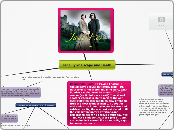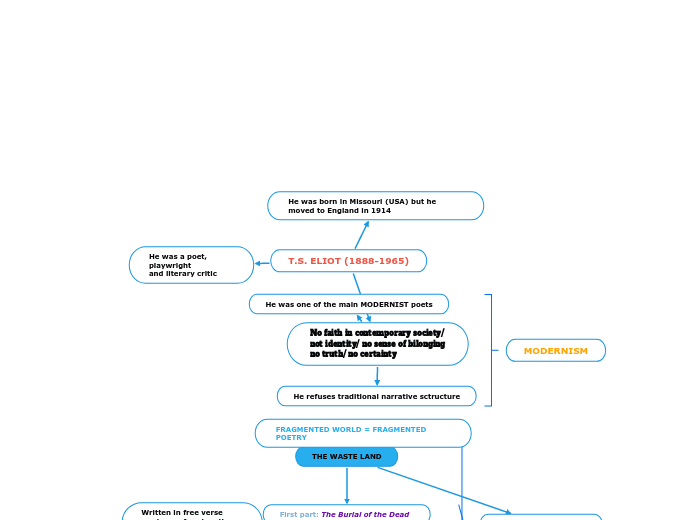Jane Eyre: Escape and Death
Connecting Quote! In leaving England, I should leave a loved but empty land – Mr. Rochester is not there; and if he were, what is, what can that ever be to me? […] Of course (as St. John once said) I must seek another interest in life to replace the one lost: is not the occupation he now offers me truly the most glorious man can adopt or God assign? Is it not, by its noble cares and sublime results, the one best calculated to fill the void left by uptorn affections and demolished hopes? I believe I must say, Yes – and yet I shudder. Alas! If I join St. John, I abandon half myself: if I go to India, I go to premature death.
Death
Death of Relationship
I have lived a full life here. I have not been trampled on. I have not been petrified. I have not been excluded from every glimpse that is bright. I have known you, Mr. Rochester and it strikes me with anguish to be torn from you.
Death is seen as an end to all things, and the end of all things is seen as a death even if that it is not the literal case. Jane still feels pain and liss as if she has experienced a death when she leaves Rochester.
Can the death of a relationship kill also the love felt?
I have told you, reader, that I had learnt to love Mr.Rochester: I could not unlove him now…
Relatioships are fickle, but often the feelings are lasting. Simply because Jane can not be with rochester does not mean she is capable of unloving him.
Death leading to loneliness
I was a discord in Gateshead Hall; I was like nobody there; I had nothing in harmony with Mrs. Reed or her children, or her chosen vassalage. If they did not love me, in fact, as little did I love them. They were not bound to regard with affection a thing that could not sympathize with one amongst them; a heterogeneous thing, opposed to them in temperament, in capacity, in propensities; a useless thing, incapable of serving their interest, or adding to their pleasure; a noxious thing, cherishing the germs of indignation at their treatment, of contempt of their judgment. I know that had I been a sanguine, brilliant, careless, exacting, handsome, romping child – though equally dependent and friendless – Mrs. Reed would have endured my presence more complacently; her children would have entertained for me more of the cordiality of fellow-feeling; the servants would have been less prone to make me the scape-goat of the nursery.
Jane is an orphan and at this point knows more of death than any ten year old. She feels unwelcome in a home that is not her own. She is constantly alone and stuck in her own head, because everyone she has loved has left her and died.
Unattainable Needs
Listen to me. Listen. I could bend you with my finger and my thumb. A mere reed you feel in my hands. But whatever I do with this cage, I cannot get at you, and it is your soul that I want. Why can't you come of your own free will?
After one feels loss, it is typical to want desperately to reclaim the past. When Rochester realizes that he is in love with Jane but can never be with her it causes him pain from which he cannot escape.
Actual Death
Her mother was my husband's sister. On his deathbed he exhorted me to care for her. I've always treated her as one of my own. If you accept her at Lowood school, Mr. Brocklehurst, keep a strict eye on her. She has a heart of spite. I'm sorry to say that her worst fault is that of deceit.
This quote does not seem significant to actual death, however it provides an example of how death has troubled Jane and saddled her with an unloving lying aunt whos cares little for her. This sorrow causes Jane great anger and grief.
Fear
Can death lead to grief?
No one knows how it started. I expect that Mrs. Poole took too much of the Gin and water as she slept the lady, Mrs. Rochester, unlocked the keys. She did what she failed to do a year ago, set the whole place to fire. We would have all perished in the smoke but Mister Rochester would not rest until we were all safe. Then he went in for her. The flames were tearing up so high it brought men running from the village. I saw her standing on the roof, the very edge. I heard Mister Rochester beg her to come down but she jumped. Mister Rochester remained as if he would not move until the fire consumed him.
This is a heartbraking moment in the story for Mr. Rochester when his wife sets the entire house on fire and procedes to jump from the roof. Rochester attempts to save her even though he no longer loves her, but when he sees that his tries were futile he is stricken with grief to the point where he cannot move and does not seem to want to move.
Avoiding Death
"Do you know, Jane Eyre, where the wicked go after death?" "They go to hell. And what is hell? A pit full of fire. Should you like to fall into this pit and be burned there forever? No, sir. How might you avoid it? I must keep in good health and not die"
Out of fear of the unknown and the incapability to comprehend what exactly happens after a person dies, people will enevitably try to avoid death or at least entertain the idea.
Death leading to Remorse
"Dread remorse when you are tempted to err, Miss Eyre: remorse is the poison of life." "Repentance is said to be its cure, sir." "It is not its cure. Reformation may be its cure; and I could reform – I have strength yet for that – if – but where is the use of thinking of it, hampered, burdened, cursed as I am? Besides, since happiness is irrevocably denied me, I have a right to get pleasure out of life: and I will get it, cost what it may."
The sorrow felt by death and loss is overwhelming. the remorse that follows is a pain like no other. It leads good people to do dangerous and horrible things that they would never do normally. Remorse leads to a want to be happy and a desperation to achieve that.
Lack of Hope which leads to Anger and Confusion
Still you are miserable; for hope has quitted you on the very confines of life: your sun at noon darkens in an eclipse, which you feel will not leave it till the time of setting. Bitter and base associations have become the sole food of your memory: you wander here and there, seeking rest in exile: happiness in pleasure – I mean in heartless, sensual pleasure – such as dulls intellect and blights feeling. Heart-weary and soul-withered, you come home after years of voluntary banishment: you make a new acquaintance – how or where no matter: you find in this stranger much of the good and bright qualities which you have sought for twenty years, and never before encountered; and they are all fresh, healthy, without soil and without taint. Such society revives, regenerates: you feel better days come back – higher wishes, purer feelings; you desire to recommence your life, and to spend what remains to you of days in a way more worthy of an immortal being. To attain this end, are you justified in overleaping an obstacle of custom – a mere conventional impediment which neither your conscience sanctifies nor your judgment approves?"
In this quote a breif glimpse of hope is discussed and then renched away by anger and confusion. Jane feels like hope has abandoned her leaving her to find empty happiness. this only confuses and angers her to a point where she is no longer capable of hiding these feelings.
Metaphorical Death
To marry you would kill me.
This is a representation of Jane's sarcasm, and also the unspoke truth that it would honestly destroy Jane emotionally and socially to marry Rochester.
Escape
’Ere I had finished this reply, my soul began to expand, to exult, with the strangest sense of freedom, of triumph, I ever felt. It seemed as if an invisible bond had burst, and that I had struggled out into unhoped-for liberty. . . .
Jane gains freedom from telling Mrs.Reed her feelings about her.
Can one gain freedom through escape?
Rebellion
Nobody knows how many rebellions besides political rebellions ferment in the masses of life which people earth. Women are supposed to be very calm generally: but women feel just as men feel; they need exercise for their faculties, and a field for their efforts as much as their brothers do; they suffer from too rigid a restraint, too absolute a stagnation, precisely as men would suffer; and it is narrow-minded in their more privileged fellow-creatures to say that they ought to confine themselves to making puddings and knitting stockings, to playing on the piano and embroidering bags. It is thoughtless to condemn them, or laugh at them, if they seek to do more or learn more than custom has pronounced necessary for their sex.
Jane is criticizing society for the standard woman's role of her day and analyzing her own 'rebellions' compared to others. She assumes their must be many from day to day that aren't ever mentioned. People attempt to escape or moreso, find themselves through these small rebellions.
Rebellion Within Self
But, then, a voice within me averred that I could do it and foretold that I should do it. I wrestled with my own resolution: I wanted to be weak that I might avoid the awful passage of further suffering I saw laid out for me; and Conscience, turned tyrant, held Passion by the throat, told her tauntingly, she had yet but dipped her dainty foot in the slough, and swore that with that arm of iron he would thrust her down to unsounded depths of agony.
Jane is understanding that their is more than one way to gain freedom and escape from something unwanted. And that the best way is not the easiest way for her. She does not want to leave Mr.Rochester, yet her Conscience tells her that her morals make it so.
I can see in you the glance of a curious sort of bird through the close-set bars of a cage, a vivid, restless, captive. Were it but free, it would soar, cloud high.
Mr.Rochester compares Jane to a bird in a cage.
Unexpected Sadness
But the answer my mind gave – "Leave Thornfield at once" – was so prompt, so dread, that I stopped my ears. I said I could not bear such words now. "That I am not Edward Rochester’s bride is the least part of my woe," I alleged: "that I have wakened out of most glorious dreams, and found them all void and vain, is a horror I could bear and master; but that I must leave him decidedly, instantly, entirely, is intolerable. I cannot do it.
Jane is fighting with her possible ways of escape now, she claims she is least worried that she will not marry Mr.Rochester, but that her whole life so far has been a lie.
I am a free human being with an independent will, which I now exert to leave you.
Jane uses her freedom of will to push away her emotions about Mr.Rochester when he attempts to manipulate her to stay. Jane is becoming more and more independent as she experiences her freedom.
I should suffer often, no doubt, attached to him only in this capacity: my body would be under a rather stringent yoke, but my heart and mind would be free. I should still have my unblighted self to turn to: my natural unenslaved feelings with which to communicate in moments of loneliness.
Jane confesses she would not be physically free, but she can be spiritually free.
Can escape lead to Happiness?
A wind fresh from Europe blew over the ocean and rushed through the open casement: the storm broke, streamed, thundered, blazed, and the air grew pure. I then framed and fixed a resolution. While I walked under the dripping orange-trees of my wet garden, and amongst its drenched pomegranates and pine-apples, and while the refulgent dawn of the tropics kindled round me – I reasoned thus, Jane – and now listen; for it was true Wisdom that consoled me in that hour, and showed me the right path to follow.
Mr.Rochester escapes from his past to become the happier man Jane meets him as. He believes that his time spent away from his troubles, let Wisdom into his mind and showed him how to manage his new life.
Is it possible for escape to lead to excitement?
Go,’ said Hope, ‘and live again in Europe: there it is not known what a sullied name you bear, nor what a filthy burden is bound to you.
Mr.Rochester is excited that he realizes his possible escape through Europe. He personifies "Hope" to exaggerate his feelings that he may start a new name with a new life without ties to his old one.









